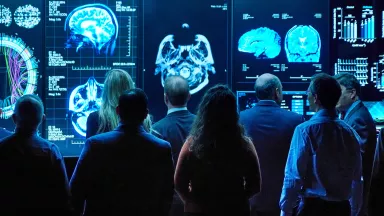What Are Cognitive Deficit Disorders?
Neuropsychiatry is a field in psychology that studies the relationships between behavior and the brain’s function. This specialty focuses on behavioral and cognitive conditions that can be traced to brain malfunction. Examples of neuropsychiatric disorders are attention-deficit/hyperactivity disorder (ADHD), bipolar disorder (BP), major depressive disorder (MDD), addiction and schizophrenia.
The most common types of neuropsychiatric disorders include attention and cognitive deficit disorders (ADHD and CDDs), anxiety, depression, addiction, migraine headaches, seizures, eating disorders and uncontrolled anger. The commonality among diagnoses is a combination of problems with brain function, controlling emotions and mood.
Cognition is the mental action or process of acquiring knowledge and understanding through thought, experience and the senses. It encompasses various aspects of high-level intellectual functions and processes such as attention, memory, knowledge, decision making, planning, reasoning, judgment, perception, comprehension, language and visuospatial function, among others. "Cognitive deficit" is an inclusive term used to describe the impairment of different domains of cognition.
Types of Cognitive Deficit Disorders
Cognitive deficit disorders is an umbrella term for a group of conditions that describe an impairment in the mental capacity and cognitive processes. Examples of impairments are:
- Alzheimer’s disease
- Parkinson’s disease
- Dementia as a result of Lewy body disease
- Early-onset dementia
- Multiple sclerosis
- Traumatic head injuries (THI)
- Strokes
- Delirium
- Developmental disorders
Causes of Cognitive Deficit Disorders
The primary cause of cognitive impairment is age. Other risk factors include family history, physical inactivity and diseases/conditions such as Parkinson’s disease, heart disease, stroke, brain injury, brain cancers, drugs, toxins and diabetes.
Individuals may reduce the risk of cognitive impairment by keeping physically active, eating a healthy diet, and maintaining healthy blood pressure, blood sugar and cholesterol levels. Some causes of cognitive impairment are treatable, like infections, medication side effects, depression and vitamin B12 deficiency. It is important to identify people who are showing signs of cognitive impairment to ensure that they are evaluated by a healthcare professional and receive appropriate care or treatment.
Apart from increasing age, hypertension, diabetes, hypercholesterolemia, smoking and obesity are thought to be responsible for the clearance of amyloid (protein) from the brain, which in turn increases the risk of developing Alzheimer’s disease. A higher risk of Alzheimer’s disease, in particular, is associated with the presence of a number of these risk factors at the same time and while the person is in their 50s. So it is essential to maintain healthy blood pressure, blood sugar and blood cholesterol.
Environmental and behavioral interventions are beneficial, especially in managing behavioral problems. Simple approaches such as noise cancellations and redirecting attention, maintaining a familiar environment, providing security objects, monitoring personal comfort and avoiding confrontation can help in managing behavioral issues. Regular aerobic exercise and the Mediterranean Diet have been shown to slow the progression of Alzheimer’s disease.
Risk Factors for Cognitive Deficit Disorders
Age is the primary risk group for CDDs, but risk factors include family history, physical inactivity, and disease/conditions such as Parkinson’s disease, heart disease, stroke, brain injury, brain cancers, drugs, toxins and diabetes. Individuals may reduce the risk of cognitive impairment by keeping physically active, eating a healthy diet and maintaining healthy blood pressure, blood sugar and cholesterol levels. Some causes of cognitive impairment are treatable, like infections, medication side effects, depression and vitamin B12 deficiency. It is important to identify people who are showing signs of cognitive impairment to ensure that they are evaluated by a healthcare professional and receive appropriate care or treatment.
Apart from increasing age, hypertension, diabetes, hypercholesterolemia, smoking and obesity are thought to be responsible for the clearance of amyloid (protein) from the brain, which in turn increases the risk of developing Alzheimer’s disease. A higher risk of Alzheimer’s disease, in particular, is associated with the presence of a number of these risk factors at the same time and while the person is in their 50s, so it is essential to maintain healthy blood pressure, blood sugar and blood cholesterol levels.
Screening for & Preventing Cognitive Deficit Disorders
There are various screening tools used by patients, families and physicians to assess cognitive abilities. Screening is to identify those patients who deserve a complete diagnostic assessment. Physicians often assess the patient’s mental status with a brief test, such as the Mini-Mental State Examination (MMSE). However, the experts have identified several new and improved instruments suited for use in primary care settings. Popular tools used by primary care physicians are:
- General practitioner assessment of cognition (GPCOG)
- Memory impairment screen (MIS)
- Montreal Cognitive Assessment (MOCA)
- Mini-Cog
- Memory and executive screening (MES)
The Short Informant Questionnaire on Cognitive Decline in the Elderly (IQCODE), Dementia Severity Rating Scale (DSRS), AD-8 and General Practitioner Assessment of Cognition (GPCOG) can be used to gather information from caretakers/family members. Individuals who fail these tests need further diagnostic evaluation or a referral to a specialist. In addition, more detailed neuropsychological testing may help determine the type and degree of impairment and what mental skills are impaired.
Different tools have different applications according to the presenting case. For example, the Montreal Cognitive Assessment (MOCA) is mostly used for general screening because of its coverage of a broad array of cognitive functions. The Mini-Mental State Examination (MMSE) is used for the evaluation of patients with Alzheimer’s disease because of its main focus on testing memory.
For those at high risk looking to prevent cognitive deficit disorders, limiting exposure to air pollution, avoiding excessive alcohol and cigarette smoke, managing health conditions like weight, depression, diabetes and blood pressure, and eating a healthy diet are all shown to be effective.
Signs & Symptoms of Cognitive Deficit Disorders
Cognitive deficit is not an illness in itself but a manifestation of an underlying condition. The patient may notice these changes themselves, but most often it is noticed by the caretakers and friends of the patient. The patients usually have the following:
- Trouble remembering things (frequently asking the same question or repeating the same story again and again)
- Difficulty in learning new things and concentrating
- Vision problems and trouble speaking
- Difficulty recognizing people and places; they often find new places or situations overwhelming
- Confusion or agitation
- Mood changes
- Change in their behavior and/or speech
- Difficulty even with their usual daily tasks
Cognitive impairment can come and go or wax and wane, and can be mild, severe or anything in between. With mild impairment, there are changes in cognitive functions, but the individual can still do their everyday activities. Severe levels of impairment (dementia) can lead to a point where the individual is incapable of living independently because of the inability to plan and carry out regular tasks (activities of daily living/instrumental activities of daily living) and apply judgment.
Cognitive deficits may accompany symptoms of other problems, such as head injury, stroke or dementia. The patient might have behavioral or personality changes, loss of consciousness, vision changes, imbalance, severe headaches, seizures, sleep pattern changes, numbness, weakness and paralysis.
Cognitive disorder includes delirium and both mild and major neurocognitive disorder, which may include the following symptoms:
- Delirium develops very rapidly and over a short period of time. It is mainly characterized by disturbances in cognition. Other symptoms are confusion, disorientation, excitement and also a change in consciousness. Hallucinations and illusions may be common. It also makes processing new information and situational awareness very difficult. Its onset ranges from minutes to hours and sometimes days. However, it only lasts a few hours to weeks. It can also be accompanied by inattention, mood swings or abnormal behaviors. There is usually an underlying medical or surgical condition causing it. Delirium during a hospital stay can result in complications and long-term stay.
- Mild and major neurocognitive disorders are commonly associated with the elderly. These disorders develop slowly and are mainly characterized by memory loss in addition to cognitive impairments. There may also be psychosis, agitation and mood changes. The difference between mild and major neurocognitive disorders is mainly based on the severity of the symptoms. Major neurocognitive disorder (previously known as dementia) is characterized by significant cognitive decline and the development of dependence. Mild neurocognitive disorder is characterized by moderate cognitive decline, and the patient is still independent. To be diagnosed, delirium and other mental disorders should be ruled out. For causes of dementia, such as age, which is irreversible, the decline of cognition and memory is lifelong.
Diagnosing Cognitive Deficit Disorders
Evaluation for cognitive deficit disorders consists of detailed history from the patient and family members (including the onset, duration, symptoms, impact, impact on activities of daily living, and changes from the patient’s previous level of execution and functioning) and clinical assessment of the patient that encompasses a wide range of information collected from physical, neurological and mental status examinations.
The history gathered from the patient and the accompanying family/friends should be focused on the following:
- Changes in cognitive functions (the onset of changes, how the changes have evolved and detailed examples of the changes witnessed)
- Change in functional status/self-care (cooking, testing, hygiene, finances)
- Physical symptoms (nausea, vomiting, vision, hearing, speech, balance, gait, balance, sensation, motor functions)
- Psychiatric symptoms (mood changes, behavioral and personality changes)
- Current medications, if any
There are various screening tools used by patients, families and physicians to assess the patient’s cognitive abilities. Screening is to identify those patients who deserve a complete diagnostic assessment. Physicians often assess the patient’s mental status with a brief test, such as the Mini-Mental State Examination (MMSE). However, the experts have identified several new and improved instruments suited for use in primary care settings. Popular tools used by primary care physicians are:
- General practitioner assessment of cognition (GPCOG)
- Memory impairment screen (MIS)
- Montreal Cognitive Assessment (MOCA)
- Mini-Cog
- Memory and executive screening (MES)
Questionnaires can be used to gather information from caretakers/family members. Individuals who fail these tests need further diagnostic evaluation or a referral to a specialist. In addition, more detailed neuropsychological testing may help determine the type and degree of impairment and what mental skills are impaired.
Different tools have different applications according to the presenting case. For example, the Montreal Cognitive Assessment (MOCA) is mostly used for general screening because of its coverage of a broad array of cognitive functions. The Mini-Mental State Examination (MMSE) is used for the evaluation of patients with Alzheimer’s disease because of its main focus on testing memory.
As part of the physical exam, the physician should perform a detailed neurological examination to determine the involvement of the brain and nervous system. These tests can help detect neurological signs of different brain pathologies like stroke, Parkinson’s disease, brain tumors or other medical conditions. The neurological exam includes the basement of mental status, cranial nerves, motor and sensory functions, reflexes, coordination, balance and gait.
Other tests depend upon the accompanying physical signs and symptoms. It may include complete blood count, thyroid tests, vitamin B12 levels, basic metabolic panel, urine analysis, liver function tests and renal function tests, which may help find out different infectious causes and metabolic disorders. Also, brain imaging like computed tomography (CT) and magnetic resonance imaging (MRI) scans may be useful to delineate brain pathologies like brain tumors, bleeding or stroke.
Treating Cognitive Deficit Disorders
Treatment of cognitive deficits depends on what actually is causing impairment. If it is caused by an illness or a condition, then it is likely that you will recover after the treatment. Infections and metabolic syndromes, depression, thyroid disorders and medication effects are some curable causes of cognitive decline. For cognitive disorders, interventions focus mainly on the improvement of quality of life and the limitation of residual defects.
There is no pharmacological treatment for mild cognitive impairment. Management is focused on promoting basic daily functions. Counseling is a very important component of patient management, as these individuals are at higher risk for trouble with mobility and recurrent falls. Problems with vision and hearing need to be addressed and corrected. People with sleep apnea may benefit from continuous positive airway pressure (CPAP).
Medications such as antipsychotics or benzodiazepines can help reduce the symptoms in some cases of delirium. For alcohol abuse or malnourished cases, vitamin B supplements are recommended. Some extreme cases also require life support. Ginkgo biloba is a popular herbal supplement that is thought to improve cognition and memory. However, it has failed to prevent cognitive decline in those with mild cognitive impairment.
Physical activity, cognitive training and exercises, proper sleep and relaxation techniques can help cognitive health. The Mediterranean Diet may also help people with cognitive impairment. Occupational therapy focuses on teaching different patient strategies to minimize the effect of cognitive impairment on daily life. Environmental approaches, such as reducing noise around the patient, help the patient focus on tasks and reduce distraction, confusion and frustration.
Psychotherapy and psychosocial support for patients and families have evidence of better outcomes in clear understanding and proper management of the disorder and therefore maintaining a better quality of life for everyone involved.
Alzheimer’s disease has no cure, but available medications slow the worsening of dementia symptoms and help improve cognition and behavioral problems. Behavioral symptoms are common and can exacerbate cognitive and functional impairment in patients. Secondary symptoms of Alzheimer’s disease, like depression, delusion, agitation, aggression, sleep disorders and hallucinations, also need treatment. Psychotropic medications like antidepressants, anxiolytics, neuroleptics, beta-blockers, antiparkinsonian agents and antiepileptic drugs (for their effects on behavior) are regularly used. Cognitive decline in normal aging is usually mild and requires behavioral and supportive interventions only.
Living with Cognitive Deficit Disorders
Work with your healthcare team to develop a treatment plan, being careful to review all prescription and over-the-counter medications and supplements. Carefully track all side effects, particularly those that might be contributing to cognitive decline.
Stay organized with a pill organizer, and work with a family member or caregiver to stay on schedule. Make careful note of all symptoms that change with each medication, including depression, and blood pressure. Before adding a new medication, be certain to discuss any possible adverse interactions with what you are already taking.
Make an appointment for a follow-up visit within a specific timeframe (four to six weeks), especially if new medication is prescribed. Bring a relative or friend to each visit.




